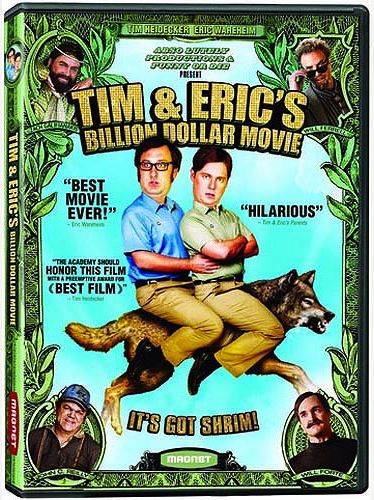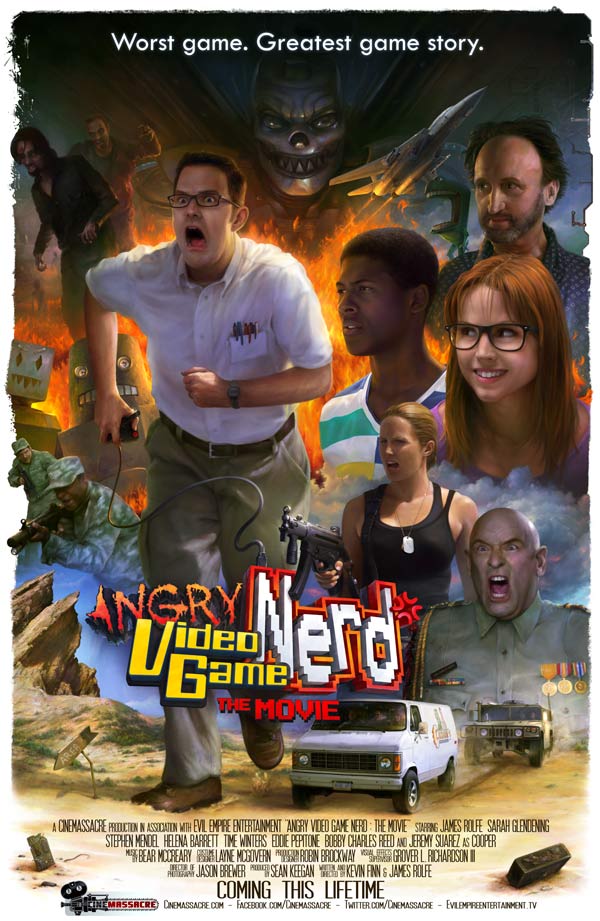 Tim and Eric’s comedy is about weapon-grade awkwardness. They’re the kings of off-kilter timing, inexplicable malapropisms, garishly slapdash special effects, and reaction shots that last two seconds too long. Their style resembles banal daytime TV fed through some sort of cosmic dislocator so that everything is 10-15% off.
Tim and Eric’s comedy is about weapon-grade awkwardness. They’re the kings of off-kilter timing, inexplicable malapropisms, garishly slapdash special effects, and reaction shots that last two seconds too long. Their style resembles banal daytime TV fed through some sort of cosmic dislocator so that everything is 10-15% off.
Although in this case, it’s more like a banal direct to video movie. The premise: the Schlaaang corporation gives Tim and Eric a billion dollars to make a movie, which they squander on diamonds, helicopter rides, and a $500,000 a week spiritual guru. When they deliver a ridiculous 3 minute film starring a Johnny Depp impersonator, an enraged Tommy Schlaaang orders them to pay back the billion dollars. Destitute, they end up hiding at a derelict mall while ducking Schlaaang’s thugs.
Tim and Eric adjust to their new home, which is filled with such oddities as a used toilet paper store, a sword salesman who earns money by not selling swords, and a man-eating wolf that stalks the food court. They make friends, and enemies, and learn an important lesson: sometimes you gotta bring knives to a gunfight.
Some scenes perfectly nail the uncomfortable Tim and Eric vibe (there’s an almost impossible to watch scene where Eric starts to loudly masturbate off-camera, and it doesn’t let us go until he reaches his climax). Other scenes drag like hell, and have little energy. There’s a scene where Tim and Eric are trying to buy the mall from a neurotic Will Ferrell, and he forces them to watch Top Gun not once but twice. It probably sounded hilarious on paper. On screen, you’re thinking “okay…feel free to go somewhere with this any time, boys.”
This movie exposes the limitations of the Tim and Eric format, which is that they have trouble sustaining interest in their schtick for long periods of time. They were at their best in Awesome Show, Great Job, where they bombarded you with sketch after sketch. While you were still recovering from a left hook, in swings the right. But the artistic strictures of film means they have to keep scenes going, and going, and going…and the cider goes flat. They rely on the unexpected, and too much of the unexpected means your tastes adjust downward like a pupil under a bright light. Their ironic kitsch starts to seem like genuine kitsch. Their awkward pauses and affectations seem like random stupidity.
It’s fun to be in Tim and Eric’s world, but honestly you don’t want to be there for long. Billion Dollar Movie is like spending 94 minutes on a roller coaster. Fun at first, but after a certain point you just want to get off.
 Disclaimer: if it has “James Rolfe” or “AVGN” on it, I am there, wearing the t-shirt. Say what you will about his writing and acting skills, the concept he had (a foul-mouthed nerd plays and critiques “shitty games that suck ass”) made him one of the original Youtube viral successes, and he never had to lip-sync an embarrassing europop song to do it.
Disclaimer: if it has “James Rolfe” or “AVGN” on it, I am there, wearing the t-shirt. Say what you will about his writing and acting skills, the concept he had (a foul-mouthed nerd plays and critiques “shitty games that suck ass”) made him one of the original Youtube viral successes, and he never had to lip-sync an embarrassing europop song to do it.
That said, here comes the pain.
What can I say about the long-awaited AVGN movie? It isn’t funny. It consumed a quarter of a million dollars, several years of James’ life, and deprived us of countless AVGN episodes…and I sat in my seat, waiting nearly two hours for it to get good. I laughed about three times. Mostly because the movie was trying so damn hard that I didn’t want to hurt its feelings. It uses the “two people sound like they’re having sex but they’re actually doing something different” gag. That’s the kind of screenplay-level desperation we’re dealing with here.
The concept behind the movie is the notoriously bad Extra-Terrestrial videogame for the Atari 2600 (which killed the early videogame industry, was mass-buried in landfill, blah blah, everyone knows the story). Remember how it became a running joke that James would refuse to review that game? Well, he’s finally doing it. But why the chickenshit renaming of “ET” to a fictionalised game called “Eee-Tee”? It’s not as if isn’t selling DVDs full of copyrighted game footage already.
The film’s surprisingly talky and elaborate for a character normally associated with scatological profanity and temper tantrums. Soon we learn about government conspiracies and Area 51 and alien baddies. Is there a need for this stuff? We just want to see James doing his thing: ripping on shitty games. Instead we’ve got him uncomfortably acting out weird, not especially funny scenarios with a cast of characters we don’t care much about.
The problem isn’t the small budget – Blair Witch was made for less. The problem is James: and his comedic limitations. Here’s the harsh truth: he isn’t a jack of all trades, able to sing and dance and conjugate sixteen versions of “shitwaffle”. He lucked his way into a format that he was well-suited for (10-20 minute web shorts)…but that’s pretty much where his talents end. I have no desire to see him in full-length movies with actual storylines. And the moments in his AVGN videos that get high-flown and pretentious (the R.O.B. video, anyone?) are the precise moments when I set Youtube’s playback to 2x speed.
The movie winds to its conclusion, and we get to the high point: the review of ET…Or “Eee-Tee”, I guess. It’s kind of quiet and dispirited, low on rage and profanity, but it’s the best part of the movie, because it’s honest. James comes to the realisation that ET isn’t the worst game ever made, and that the problem is with us, and how we manage our expectations. One feels justified in thinking he might be talking about the movie, too – how some people expect the moon on a fucking stick, when sometimes you have to enjoy something for what it is.
That’s what I think he’s saying, anyway. But I took a different lesson from it: know your limits. James is a great web comedian. But he’s never going to be a movie star, and this movie writes “QED” on that statement with permanent ink.

I like this. It’s frequently funny, and has some good acting. It’s flaws are the “good” kind of flaws, in that they are thought provoking more than irritating.
The movie consists of various Tucker Max stories merged into a single plot. If you’ve never read Tucker Max, imagine Hunter S Thompson minus all that tiresome journalism crap. A typical Tucker Max story involves him getting drunk, variously charming and insulting people, and otherwise avoiding his inner emotional issues. His stories aren’t great literature – they’re frequently much better.
The movie revolves around three characters: Tucker, Drew (based on SlingBlade) and Dan (a composite of various Tucker Max friends), who go to a stripclub in Salem, lying to Dan’s fiancee in the process. Then begins a series of tragic misadventures where Tucker learns valuable lessons about how to…well, see for yourself. I’ll say this: the film avoids the classic ending where Tucker Max renounces his crazy ways and learns to be a nice guy. It does something more subversive and clever, while still allowing hope for the character.
The acting’s great. Matt Czuchry’s Tucker almost bounces with a likable energy – which he needs, because his role requires him to do very unlikeable stuff. The SlingBlade character is a misanthropic Napoleon Dynamite who sells every line of dialogue like he’s earning a commission. The interesting part of the movie isn’t the story, it’s the energy generated by the three male leads. IHTSBIH makes me feel the same way I feel about South Park – I don’t care much for its supposedly brilliant satire and social commentary, I just like seeing the four kids fooling around.
Unfortunately, the movie has issues. To be fair, so does Tucker Max, and those issues make him attractive to women. Doesn’t really work here, though. This movie’s issues don’t entice me towards buying it a drink, unless it’s a drink of acetone.
A lot of the lighting is pretty terrible. SOME scenes look good (like ones in the school). Others (such as the opening scene) look like they were shot by college kids on a rented Arri. How’d they fuck it up this badly?
But the main problem is the writing.
The dialogue doesn’t sound like something a person would say. It all sounds “written”. The road trip is a good example. SlingBlade gets hungry and goes on a monologue about the wonders of an American fast food chain (“…if you EVER speak ill of the Pancakewich again I will personally force-feed you one while I fuck you in the butt using the wrapper as a condom and then donkey punch you when the infused syrup nuggets explode in your mouth!”). Tucker Max fans will recognize this rant as a word-for-word recreation of a post the real-life Slingblade left on the Tucker Max Message Board. It’s funny in written form, but having an actor deliver it via monologue just sucks all the life from it. People don’t talk like that.
At one stage, Slingblade says Tucker will probably get AIDS, to which he replies “it’s basically curable. It doesn’t even show up in Magic Johnson’s blood any more.” Slingblade skips a beat and replies “so you’re saying Magic Johnson’s black…and has AIDS…and has it better than me?” …but Tucker didn’t say that. The quip wasn’t set up.
This movie made basically no money, which is a shame. At least Tucker stuck to his guns and retained creative control. I recall him saying in an interview that he would never give it to a Hollywood flack to make, because “there’s no chance he would do anything except fuck it up”. So instead, he kind of fucked it up himself. But would anything else be the Tucker Max way?
 Tim and Eric’s comedy is about weapon-grade awkwardness. They’re the kings of off-kilter timing, inexplicable malapropisms, garishly slapdash special effects, and reaction shots that last two seconds too long. Their style resembles banal daytime TV fed through some sort of cosmic dislocator so that everything is 10-15% off.
Tim and Eric’s comedy is about weapon-grade awkwardness. They’re the kings of off-kilter timing, inexplicable malapropisms, garishly slapdash special effects, and reaction shots that last two seconds too long. Their style resembles banal daytime TV fed through some sort of cosmic dislocator so that everything is 10-15% off. 

